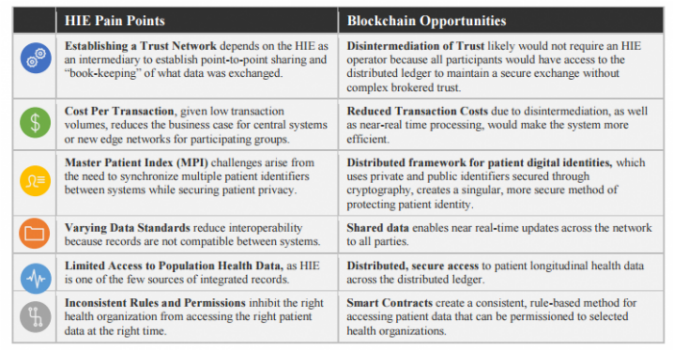Deloitte Sees Promising Future for Healthcare Blockchain
While blockchain holds many benefits for healthcare organizations, the technology may be too young for IT infrastructure deployment.

- Blockchain has the potential to transform health IT infrastructure by increasing the security, privacy and interoperability of electronic health records (EHRs), according to a recent report released by Deloitte.

Blockchain may be able to place the patient in the center of their personal health information, changing the way healthcare organizations exchange EHR data by allowing approved participants to join an exchange community rather than retrieving data from a centralized source, says Deloitte.
“The current state of health care records is disjointed and stovepiped due to a lack of common architectures and standards that would allow the safe transfer of sensitive information among stakeholders in the system,” report authors stated.
Blockchain could be the solution to the interoperability issues that have plagued the healthcare industry. Instead of relying on one centralized health information exchange (HIE), blockchain allows approved participants to join an exchange community where each user keeps an identical record eliminating the need for a centralized location to store and exchange data.
Because healthcare records are most commonly tracked and stored in an organization’s singular database, it can be difficult for a patient’s information to be shared with another organization if a patient needs to see a specialist or transfers to another primary care organization.
By using blockchain, healthcare organizations could have a standardized way to exchange data by having each individual patient be the center of their own EHR rather than the organization’s database. Each patient would be part of a nationwide blockchain transaction layer.
“This flow of information originating from the patient through the health care organization each time a service is performed does not need to stop at the individual organizational level,” report authors explained. “Instead, health care organizations could take one more step and direct a standardized set of information present in each patient interaction to a nationwide blockchain transaction layer.”
Not only would the data be more secure because it is not kept in one centralized location where it can be compromised, the data available for analytic purposes will drive research incentives that will contribute to better patient care.
The report outlines specific pain points organizations are currently experiencing and how blockchain solves them:

Healthcare organizations often struggle with establishing secure connections through traditional data exchanges and need to trust the organizations they are exchanging data with. Blockchain operates entirely different because it eliminates the need for trust between organizations because of the way it’s designed with no central hub of information.
Blockchain also eliminates the inconsistency of rules and permissions among different organizations by having all organizations operate under the same contract so all data access and permissions line up.
While blockchain has many benefits, it is not a fully mature technology organizations can deploy immediately onto their health IT infrastructure. Data standardization and operating costs are factors contributing to some industry hesitation.
Report authors advise healthcare organizations to carefully consider what information will be stored on the blockchain and what will remain in the data center. Healthcare organizations need to be mindful of the amount of information stored on the blockchain because too much information stored on the blockchain could decrease the performance of data exchanges.
Unstructured data such as free text doctor’s notes create unnecessarily large transactions with data that may not be essential to the EHR or is not in a format that another EHR system can use.
Operating costs are another concern for healthcare organizations. Because blockchain technology is so new, operating costs are largely unknown. While blockchain intends to be simpler to manage, requiring less maintenance costs, unknown expenses may reveal themselves after an organizations has already committed to the technology which they may not be able to afford.
Despite data standardization and potential cost fluctuations, blockchain could show promise in the healthcare industry by decentralizing data and easing interoperability efforts for better and more mature ecosystem of HIE. Blockchain can give patients better quality care by allowing better insight into collected data.
“Capitalizing on this technology has the potential to connect fragmented systems to generate insights and to better assess the value of care,” report authors concluded. “In the long term, a nationwide blockchain network may improve efficiencies and support better health outcomes for patients.”
Dig Deeper:
- What Does Blockchain Mean for Health IT Infrastructure?
- Exploring the Use of Blockchain for EHRs, Healthcare Big Data
